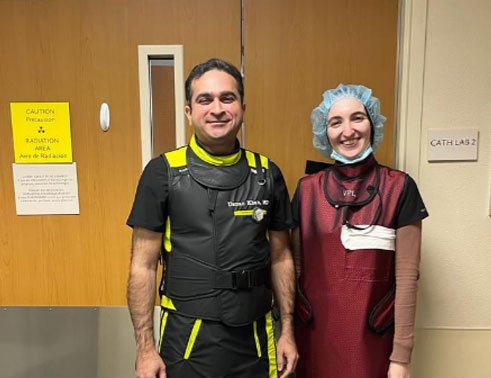During my 4-week elective with Dr. Usman Khan, I had the pleasure of rotating in the hospital and the clinic and get full exposure to the field of cardiology in all its aspects. I was exposed to a wide diversity of common cardiac and peripheral vascular presentations seen in an inpatient and an outpatient setting and learned how to manage these patients in an acute setting and their long term management. I was able to develop my history taking, physical examination as well as my communication skills by seeing patients independently in the clinic. The patient population I was exposed to ranged from patients with hypertension, hyperlipidemia, and diabetes to patients with chest pain, shortness of breath, and lower extremity pain.
In the outpatient setting, I was able to develop my counseling skills by advising patients on lifestyle modification, including diet and exercise, and smoking cessation. I also learned how to emphasize the importance of medication adherence to patients by educating them on the mechanism of action of their medications in simple terms. I was also exposed to patients presenting with vascular pathologies and was able to perform full examination of the lower extremities, counsel patients on the conservative management of varicose veins, and observe novel procedures for treating varicose veins, including Varithena and radio frequency ablation. During my elective, I also had the opportunity to observe interventional cardiology procedures, including heart catheterization and angioplasty, and I was able to learn and identify whether procedural intervention or medical management is indicated. During these procedures, I also learned about a method used in interventional cardiology that measures the degree of stenosis in affected vessels using FFR. Throughout the elective, I had the opportunity to develop my ECG reading skills by going over several ECGs per day with Dr. Khan. I was also able to correctly identify findings on echo scans and nuclear stress tests under the supervision of Dr. Khan. In addition, I gave a talk on precision-guided use of aspirin for the primary prevention of cardiovascular disease by understanding the platelet phenotype of patients. During that talk, I explained how patients with hyperactive platelets as identified by light transmission aggregometry and platelet transcriptomics would benefit most from aspirin therapy, shedding light to a new, more precise role of aspirin use for primary cardiovascular disease prevention. By the last week of the elective, I had the opportunity to strengthen my mentoring skills by providing guidance to the new batch of medical students. I guided them on how to use the EMR, how to organize their notes, and how to approach patients in a cardiac setting. In the cardiac catheterization lab, I was able to mentor them on important anatomical landmarks, pressure measurements of the heart chambers, and the indication for intervention while the doctor was performing the procedure. I reflected what Dr. Khan taught me when it comes to ECGs, echos, and nuclear stress tests and taught them how to read and correctly identify pathologies on each test. Overall, the experience was very well-rounded and comprehensive, and I became very confident in my approach to a cardiac patient by the end of it. Not only did I strengthen my medical knowledge and clinical skills, but I was able to build my teamwork and mentoring skills.

